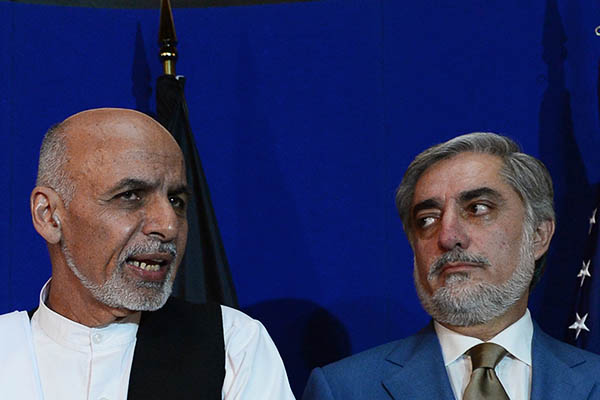Abdullah and Ghani pledge to work together for the sake of Afghanistan.
Afghanistan’s feuding presidential candidates signed a deal on Friday to form a national unity government, allowing for the possibility of a resolution to the disputed election that has threatened to revive ethnic conflict.
Ashraf Ghani and Abdullah Abdullah vowed to work together regardless of which one becomes president after an ongoing audit of all eight million votes finally declares the winner of the June 14 election. U.S. Secretary of State John Kerry, visiting Kabul to mediate an end to the impasse, welcomed the deal as a major advance in bringing Afghanistan back from the brink of political chaos as U.S.-led NATO troops withdraw. But an earlier deal brokered by Kerry last month soon frayed due to disagreements between the candidates, and attention will focus on whether all their supporters accept the latest pact.
The risk of spiraling instability has loomed large in Afghanistan since Abdullah refused to accept preliminary results that put Ghani ahead, accusing his rival of stealing the election by massive ballot-box stuffing. “Today [we] have taken another step forward in the interests of strengthening national unity … and also to bring hope for the better future for the people of Afghanistan,” Abdullah said, standing beside Ghani and Kerry. “We are committed to working together on the basis of our common vision for the future of our country.”
The signed text admitted Afghanistan was “in one of the most politically sensitive periods of its history” due to the contested outcome of an election that should herald the country’s first democratic transfer of power. “We trust each other,” Ghani said. “We will work with each other to fulfill this national duty and obligation for every Afghan. We are affirming that we will form a government of national unity … What unites us is far greater than what divided us during the campaign. He and I have reached an agreement and signed a communiqué for future cooperation.”
The deal also said that both sides agreed that the successor to outgoing President Hamid Karzai should be inaugurated before the end of this month. The timeline was a key demand of Kerry, who had stressed in talks with both candidates the importance of Afghanistan having a new president before a NATO summit in Britain on Sept. 4-5. The summit is scheduled to endorse a U.S.-led NATO “training and advisory” mission in Afghanistan next year after all foreign combat troops withdraw by December. But member nations have expressed reluctance to make costly commitments if Afghanistan fails to complete the election.
“One of these men is going to be president, but both of these men are going to be critical to the future of Afghanistan, not matter what,” Kerry said. “This audit is not about winning or losing. It is about achieving a credible result that people of Afghanistan deserve.”

